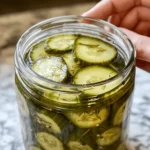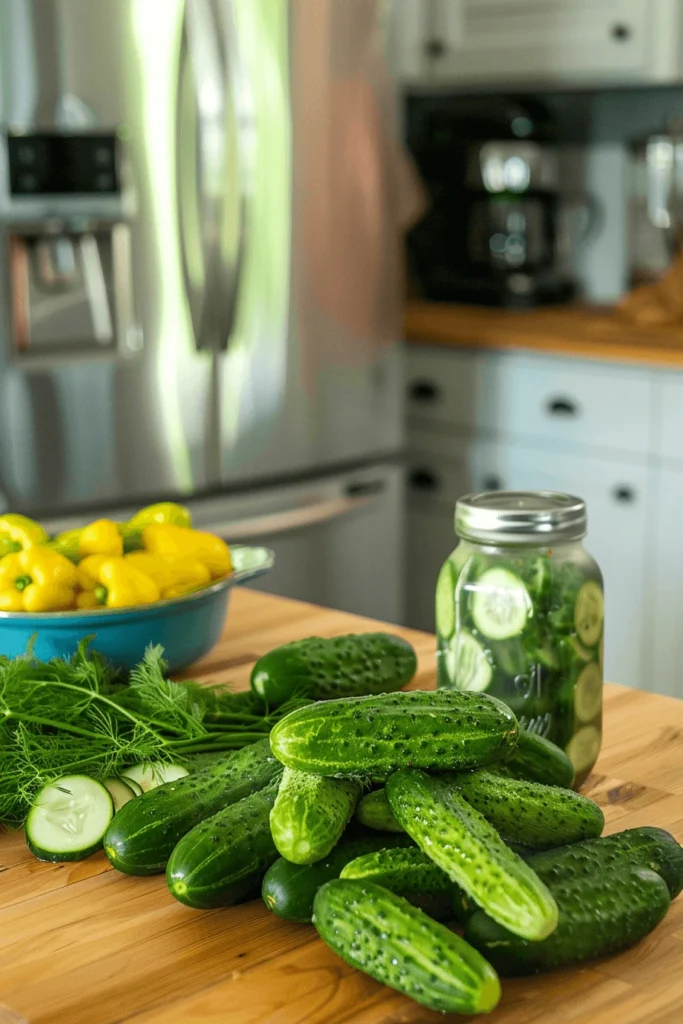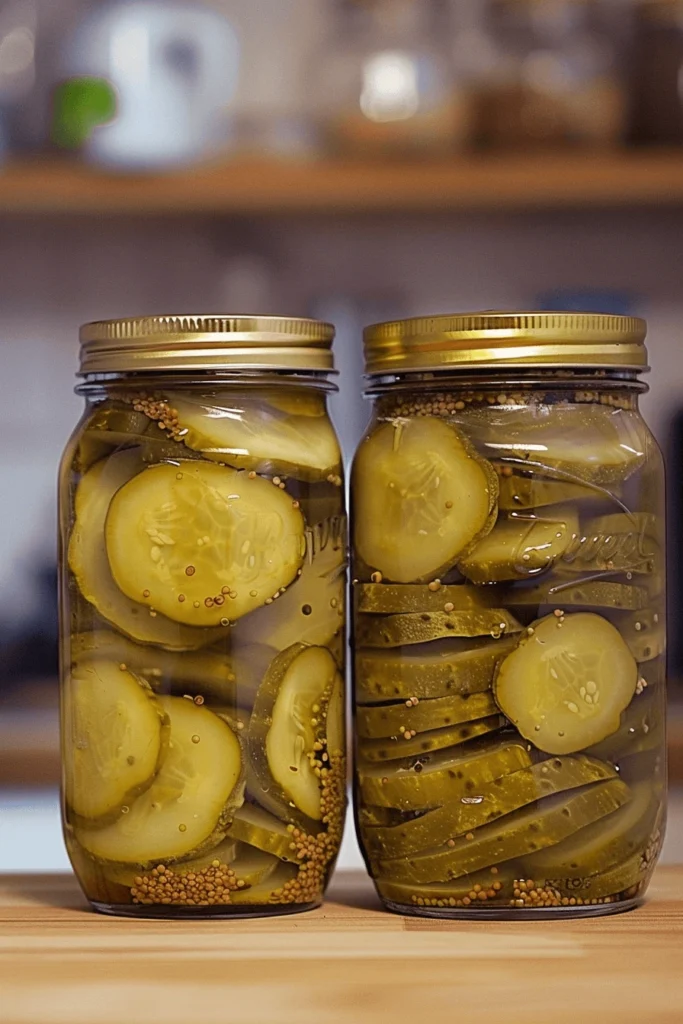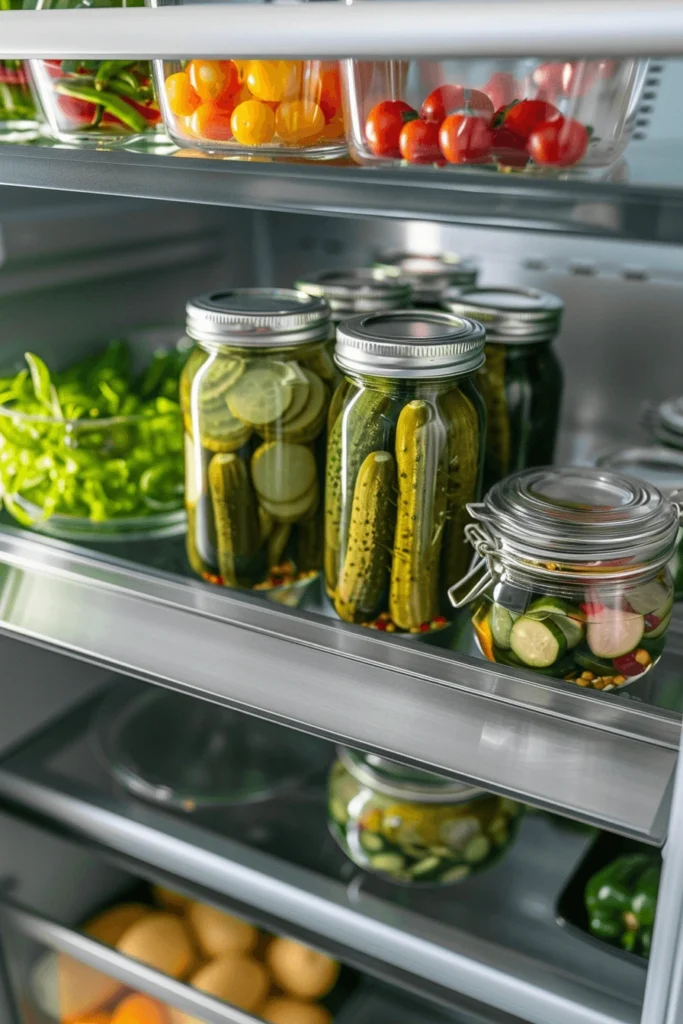If you’ve ever opened your pantry and spotted a lonely jar of pickles, you might have wondered: “Do pickles refrigerate or not?”
Some jars live happily on the counter, while others demand fridge real estate like VIPs at a pickle party. It’s a briny mystery that has left many home cooks scratching their heads—and sometimes sniffing their jars.
In this article, we’re diving into everything you need to know about pickles refrigerate rules. You’ll learn why some pickles stay on the shelf, which ones belong in the fridge, and how to keep your crunchy friends safe and flavorful.
Table of Contents
Why Pickles Refrigerate and When It Matters
Understanding Why Pickles Need Refrigeration
Not all pickles play by the same rules, but here’s the basic truth: pickles refrigerate because cold temperatures slow down the growth of unwanted bacteria and help preserve flavor and crunch.
- Fermented pickles like classic kosher dills often start their lives at room temperature for fermentation. But once they’re opened or fully soured, the fridge helps them last longer and keeps that satisfying snap.
- Vinegar-based pickles are often shelf-stable until opened. Refrigeration after opening helps maintain both flavor and food safety.
The Science Behind Pickle Storage
Pickles survive through a combination of salt, vinegar, and sometimes natural fermentation. This acidic, salty environment keeps harmful bacteria away, but only up to a point.
- Shelf-stable pickles are pasteurized and vacuum-sealed, which makes them safe to store in a pantry until you twist the lid.
- Fresh pack or refrigerated pickles are not heat-treated. They must stay cold from the grocery store to your kitchen to remain safe to eat.
In short, knowing why pickles refrigerate will keep your jars fresh and your meals crunchy, without the risk of spoiling your sandwich—or your stomach.

Homemade Dill Pickles
- Total Time: 15 minutes
Ingredients
3 cups vinegar
2 cups water
1 cup kosher salt
Fresh dill, garlic, cucumbers
Instructions
Mix vinegar, water, and salt (321 rule) to create brine.
Add dill and garlic to sterilized jars.
Pack cucumbers, pour brine to cover, and seal.
Refrigerate for 24–48 hours for flavor to develop.
Notes
Always let pickles refrigerate for freshness.
- Prep Time: 15 mins
Types of Pickles That Must Be Refrigerated
Identifying Pickles That Need the Cold
Not all jars are created equal, and knowing which pickles refrigerate is key to avoiding a sour surprise. Certain pickles are sold in the refrigerated section for a reason: they haven’t gone through heat processing, which means they’re more prone to spoilage if left out.
- Fresh pack pickles: These are often labeled “keep refrigerated” and are commonly found in the chilled produce or deli section. They rely solely on vinegar and salt for preservation without heat-pasteurization.
- Fermented pickles: These include traditional kosher dills and other naturally soured varieties. Once fermentation is complete or the jar is opened, refrigeration helps them retain flavor and crunch.
If your pickle jar came cold from the store, it needs to stay cold at home. Ignoring that rule can shorten the shelf life and lead to spoilage.

The Role of Ingredients in Refrigerated Pickles
The ingredients can give you clues about storage. Pickles with added sugar, garlic, or fresh herbs often have a higher risk of mold or yeast growth if left out.
- Refrigerated dill pickles usually have fresh dill sprigs and garlic cloves.
- Bread and butter pickles with sugar and onions benefit from the cold to prevent softening and off-flavors.
Storing these varieties in the fridge not only prevents bacteria growth but also keeps that signature crunch that makes every burger or sandwich pop.
Discover great ideas like Carrot Raisin Salad for a tangy side that pairs perfectly with your refrigerated pickles.
The 321 Rule for Pickles Explained
What Is the 321 Rule for Pickles?
The 321 rule for pickles is a simple formula that every pickle lover should know, especially if you want to store your jars correctly and understand how long your pickles refrigerate safely. The rule stands for:
- 3 parts vinegar – This creates the acidic environment that stops harmful bacteria.
- 2 parts water – This balances the sharpness of the vinegar while keeping the brine effective.
- 1 part salt – Salt draws out moisture from vegetables and acts as a natural preservative.
Following the 321 rule ensures your pickles have the right balance of safety, crunch, and flavor whether you keep them in the fridge or on the shelf when sealed.
Why the 321 Rule Keeps Refrigerated Pickles Safe
When you follow the 321 ratio, your pickles refrigerate longer without losing quality. The proper acid and salt levels combined with cold storage prevent spoilage and mold.
- Refrigerated pickles with the 321 brine stay crisp and flavorful for weeks.
- A weak brine without enough vinegar or salt can lead to mushy pickles or unsafe jars if stored outside the fridge.
- Using the 321 method ensures that when your pickles refrigerate, they maintain both taste and safety.
Are Pickles Safe if Left Out Overnight?
Can Pickles Sit at Room Temperature?
It’s a common kitchen oops: you enjoyed a sandwich, left the pickle jar on the counter, and only realized it the next morning. But can pickles refrigerate after being left out overnight and still be safe?
- Shelf-stable pickles: If the jar was unopened and commercially sealed, it’s usually safe at room temperature. Simply refrigerate after opening.
- Refrigerated pickles: If your pickles were meant to stay cold from the start, leaving them out overnight can risk bacterial growth and soften their crunch.
A good rule: if your pickles start in the fridge at the grocery store, they must stay there at home.
How to Decide If They’re Still Good
If you accidentally leave a jar out, inspect before eating:
- Check the brine: Cloudiness, slime, or bubbles that weren’t there before are warning signs.
- Smell the pickles: A sour, off odor means they’ve spoiled.
- Look for color changes: A dull or brownish tone can indicate they’re no longer safe.
When in doubt, toss them. Keeping your pickles refrigerate consistently is the safest path to prevent foodborne illness.
Don’t miss our Korean Carrot Salad, a tangy side dish that pairs perfectly with fresh, chilled pickles.
How to Tell If Pickles Are Bad
Signs That Your Pickles Have Spoiled
Even if your pickles refrigerate properly, they can eventually spoil. Knowing the signs can prevent a nasty surprise at mealtime. Watch for:
- Cloudy or slimy brine: A slight cloudiness can be normal for fermented pickles, but thick slime means spoilage.
- Foul or sour odor: A strong off-smell is a clear sign your pickles are no longer safe to eat.
- Color changes: Discolored or dull pickles, especially brownish tones, signal they’re past their prime.
- Soft or mushy texture: When a pickle loses its crunch, it’s often because bacteria or yeast have taken over.

Why Refrigeration Matters in Preventing Spoilage
Keeping your pickles refrigerate slows bacterial growth and extends freshness. Even shelf-stable jars benefit from cold storage after opening.
- Refrigeration keeps the brine clear and flavors sharp.
- It reduces the risk of yeast growth and mold on the surface.
- Fresh-pack or deli pickles can spoil in just hours if left out, but the fridge extends their life for weeks.
Best Practices for Storing Pickles
General Storage Guidelines for Pickles
Proper storage is the key to keeping your pickles refrigerate safely and maintaining that perfect crunch. Whether they’re homemade or store-bought, follow these steps:
- Check the label: If it says “Keep Refrigerated,” it’s not optional.
- Seal tightly after every use: Exposure to air invites bacteria and mold.
- Store in the coldest part of the fridge: Usually near the back, where the temperature is most stable.
- Avoid cross-contamination: Always use a clean utensil to remove pickles from the jar.
These habits ensure your pickles last longer and keep that crisp, tangy bite.

Shelf Life of Pickles in the Fridge vs. Pantry
The type of pickle and storage method determine how long it stays safe. Here’s a quick reference:
| Type of Pickle | Pantry (Sealed) | Fridge (Opened) |
|---|---|---|
| Shelf-stable vinegar pickles | 12–18 months | 1–3 months |
| Fresh pack refrigerated pickles | Not recommended | 1–2 months |
| Homemade fermented pickles | 1–2 weeks | 1–2 months |
Cold storage extends freshness and reduces the risk of spoilage. Even if a jar is technically shelf-stable, letting your pickles refrigerate after opening is the safest and most flavor-friendly choice.
Discover great ideas like Lazy Southern Recipes for meals that pair perfectly with crunchy, cold pickles.
Common Mistakes When Storing Pickles
Leaving Pickles Out Too Long
One of the biggest mistakes is forgetting to put your pickles refrigerate after opening.
- Refrigerated pickles can spoil in hours if left on the counter.
- Even shelf-stable pickles lose their crunch and flavor if left open at room temperature.
A simple rule: if they came from the fridge at the store, they go straight to the fridge at home.
Using Dirty Utensils
Another common slip-up is using fingers or a used fork to grab pickles from the jar. This introduces bacteria and speeds up spoilage.
- Always use a clean utensil.
- Avoid double-dipping in the brine.
Keeping your pickles refrigerate won’t help if the brine is contaminated.
Ignoring the Expiration or Best-By Date
Many people assume pickles last forever, but that’s a myth. Ignoring expiration dates or best-by labels can lead to unsafe snacking.
- If the pickles look off, smell sour in the wrong way, or the brine seems slimy—toss them.
- Proper storage and vigilance extend the life of your pickles, but nothing lasts forever.
Conclusion – Keep Your Pickles Safe and Crunchy
In the end, understanding how pickles refrigerate comes down to knowing your jar.
- Refrigerated pickles: Must stay cold to remain crisp and safe.
- Shelf-stable pickles: Can live in the pantry sealed, but refrigerate after opening to extend life.
- Follow the 321 rule: Balance vinegar, water, and salt for safe, long-lasting pickles.
By checking labels, sealing jars, and storing pickles correctly, you can enjoy every tangy crunch without worrying about spoilage. When in doubt, follow the golden rule: If it started in the fridge, it stays in the fridge.
Find more delicious recipes on GrandyRecipes’ Pinterest, and stay inspired with the newest tips and ideas by following GrandyRecipes on Facebook.